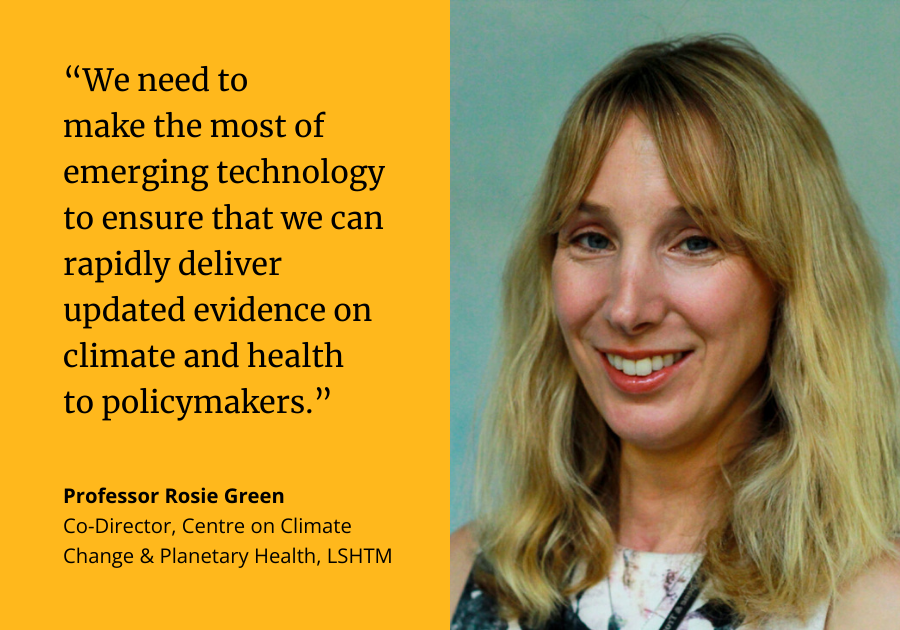
A global consortium involving researchers from the London School of Hygiene & Tropical Medicine (LSHTM) has been launched to develop new digital tools to synthesise evidence more quickly on the links between climate and health.
The team of experts will use artificial intelligence (AI) to create better ways of finding and summarising the vast amounts of research produced on the topic, to provide timely and scientifically robust evidence to policymakers.
As scientific evidence on climate and health grows, innovative methods are needed to rapidly synthesise this evidence and ensure it is effectively communicated to decision makers. The four-year project, called ‘DESTINY’ (Digital Evidence Synthesis Tool INnovation Yielding Improvements in climate & health), aims to address this challenge.
Led by the Berlin-based Mercator Research Institute on Global Commons and Climate Change (MCC), the consortium is supported by a £10.2 million grant from the Wellcome Trust.
The LSHTM team, which has received just under £920,000 of funding, will play a key role in assessing the effectiveness and real-world impact of the newly developed tools.
Rosie Green, Professor of Environment, Food and Health and Co-Director of the Centre on Climate Change & Planetary Health at LSHTM, who will be working on the DESTINY project, said: "With the exponential increase in scientific studies on the relationship between climate change and human health, manually bringing all evidence together has become very time consuming. We need to make the most of emerging technology to help us synthesise and appraise the evidence on this topic.
“LSHTM has a long tradition of conducting rigorous reviews of the evidence on climate and health, and we are delighted to combine our expertise with the MCC team's skills in machine learning to make sure that we can deliver the best and most updated evidence synthesis to policymakers in a timely way, and together work on a healthy and sustainable future.”
DESTINY will see consortium members using AI to develop novel tools that can automate and streamline tasks, such as identifying individual studies, or extracting relevant insights and themes, to make evidence synthesis faster, cheaper and more useful for policymakers.
To ensure the AI-driven tools are fit-for-purpose and work for a variety of end-users, the LSHTM team will apply them safely and responsibly to six carefully selected living evidence case studies. Living evidence is an approach that uses continuously updated evidence to ensure that the latest research findings are available at any given moment, and can be particularly useful for improving the timeliness of policy recommendations in fast-moving scientific fields. These six case studies address evidence gaps around current and pressing issues in climate and health, such as the uptake of sustainable diets, adaptation strategies to climate-related heat in cities, and the health co-benefits of climate action.
LSHTM researchers leading this workstream will co-create methods with decision makers around the world at different scales, and co-produce living systematic reviews that are constantly updated with new research as it becomes available, to enable fast, evidence-based decision making on climate and health related issues and solutions.
The consortium will bring together skills and knowledge from a diverse community of partners, including MCC, University College London, the ACRES Center for Rapid Evidence Synthesis, Future Evidence Foundation, the African Synthesis Centre for Climate Change, Environment and Development, Effective Basic Services (eBase) Africa, the Campbell Collaboration and Cochrane.
The project will start in early 2025, and takes place in the context of a wider investment into evidence-gathering infrastructure, of £54.2 million funding from both Wellcome and the UK government.
Dr Jan Minx, head of the MCC working group Applied Sustainability Science and principal investigator of the DESTINY project, said: “Stopping climate change is critical for securing human health. Policymakers need the best and most recent scientific evidence to support their decisions, but the ready-to-hand evidence is often anecdotal and outdated.
“This project is pushing the boundaries of what is possible by using the latest advances in AI. It will demonstrate that the scientific knowledge needed for health-centred climate action can be synthesised and provided almost instantly. Speed and scientific rigour can go hand in hand – this is key to efficiently solving the big issues of our time.”
Further information can be found on the DESTINY project website.
If you enjoyed this article and would like to build a career in global health, we offer a range of MSc programmes covering health and data, infectious and tropical diseases, population health, and public health and policy.
Available on campus or online, including flexible study that works around your work and home life, be part of a global community at the UK's no.1 public health university.
